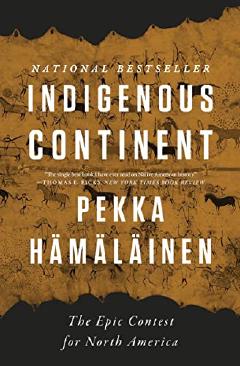
- Title
- Indigenous Continent
- The epic contest for North America
- Author
- Pekka Hämäläinen
- Format
- Audio
Several years ago I read 1491: New Revelations of the Americas Before Columbus by Charles C. Mann. I found it fascinating and eye-opening. But it also made me curious to read about these topics from the perspective of indigenous authors. All that to say: don’t be confused like I was. Indigenous Continent is not written by an indigenous author. It wasn’t until I was halfway through the book that I looked up the author out of curiosity. And then I discovered he is a white Finish man. This is an embarrassing admission. I feel somewhat excused in this mistake because it was shelved under “Indigenous Voices” at the book store in San Francisco where I first found it. Trust but verify I guess.
I don’t say this to disparage the book at all. It was very good. In the introduction, the author talks about language:
I call Native men and women involved in war “soldiers,” not “warriors.” The settlements of more sedentary Native nations are “towns,” whereas the more mobile nomadic settlements are “villages.” Rather than “chiefs,” I use either Indigenous terms for leaders or simply “officials” or “officers” because they were Indigenous administrators.
This linguistic approach has a really powerful effect on the way the stories are told, placing the wars between colonial powers and indigenous powers in congruent terms and helping to eliminate the white-supremacist baggage I carry in my own head. Of course this is more than a linguistic trick. Hämäläinen writes about indigenous sovereign nations with respect, and works hard to erase eurocentric framing and assumptions. The overall effect is powerful. Over and over I heard historical accounts I’m sure I’ve heard before (although not in so much detail) but with a totally different feel in the telling.
There’s another thing here that was eye-opening as a european-american, steeped in american hagiography and slowly coming to terms with the rot at the core of my culture. There’s a grade-school interpretation of american history that tells a story of a people at peace. Europe was the continent of unending wars, and Americans separated themselves from that, creating a continent at peace where people can live in freedom. And yet, as Indigenous Continent makes so clear, this country was in a constant state of war. From before its founding until the early 20th century, the United States was actively at war with its sovereign neighbors. This war was often fought by civilians, and involved atrocities and genocides, often carried out by bands of individuals. (And of course also carried out by official government policy.)
How does the American psyche square this with its own self-image? I can’t help but think developing a deep subconscious sense of white supremacy is essential to this. It also probably has bearing on gun culture, and a dozen other cultural illnesses that infect us to this day.
Of course I’m not describing anything new here. But the steady drumbeat of violence described in Indigenous Continent, put into terminology that is not so tainted by white supremacy, made all this very bare.
There’s so much more to this book. It’s fundamental premise is that indigenous peoples bested European powers for centuries and this is erased by modern telling. And it brings a tremendous amount of detail to this topic.
I’m still on the lookout for an academic history of the continent from an indigenous author, but meanwhile I’m glad I read this one.
